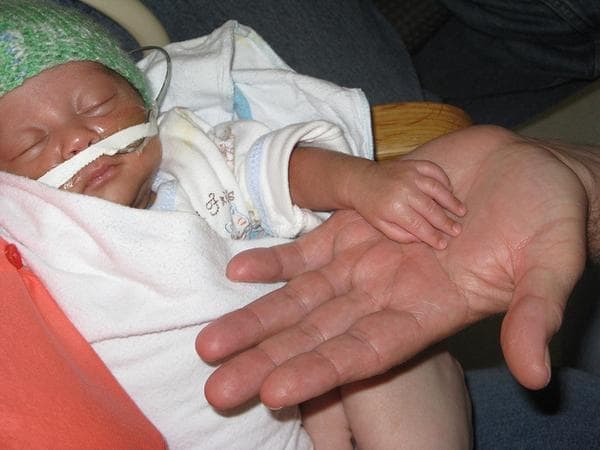Advertisement
Pregnancy Dilemma: Premature Delivery Or Risk Of Stillbirth?

This is like a card game with the highest stakes in the world, I thought as I read Boston-based science writer Eugenie Reich's harrowing story of the choice she faced when she was carrying a fetus whose growth was badly lagging. It's on Slate: "When is it right to let your unborn baby die?"
Pregnancy can be full of dilemmas that require you to weigh the odds. Do you have an invasive genetic test even if there's a small chance it will cause a miscarriage? If labor is progressing poorly, do you have a Cesarean section?
But I had never before heard of the either-or that confronted Eugenie: She could choose to deliver early, very early, and her child would face all the likely complications and disabilities of extreme prematurity. Or she could continue to carry the fetus, thus risking a high probability of stillbirth.

I wince at the very thought of it: Every day you keep the fetus in, you increase the child's chances for a less-disabled life, but you also risk losing the pregnancy altogether. It's quality of life vs. risk of loss. Every day is a roll of the dice, or maybe poker is the better metaphor: Do you hold or do you fold?
I don't think it gives away too much to say that Eugenie chose to remain pregnant, and embarked on an exploration of the world of other women who made similar decisions — but who don't usually talk or write about it except in anonymous online exchanges.
She turned up, among other things, some striking geographical disparities. Her reporting suggested that women in Mississippi will choose delivery over possible stillbirth by 22 or 23 weeks, while women in New England are likelier to hold out until 26 weeks. (Full-term is considered 40 weeks, and the earlier the birth, the worse the outcome tends to be.)
The piece begins:
Twenty-two weeks into my pregnancy, my husband and I sat in one of the exam rooms at Mass General Hospital in Boston, talking with my ob about the possibility of a delivery in the next few weeks.
An ultrasound had showed that my baby was too small for the stage of my pregnancy and that levels of amniotic fluid were low, likely because of a deteriorating placenta that would soon fail. But according to the “preemie calculator” on the National Institutes of Health website, which I had been checking for several days, most babies as small as mine, born before 26 weeks, either die in neonatal intensive care, or survive with a moderate to severe impairment as a result of their prematurity. Reading Internet message boards, I had come across an alternative, one that seemed to be publicly discussed only in the safety of those anonymous forums: to do nothing and let the fetus miscarry.
I did not know if this would be ethical, even legal, but I told my doctor that I thought our priority was the baby’s quality of life. He got it, nodded, and asked me to name a target birth weight and gestational age after which I would choose to deliver rather than lose the pregnancy.
Readers, check out this fascinating story and then please share: What would you have done?
This program aired on November 5, 2012. The audio for this program is not available.
